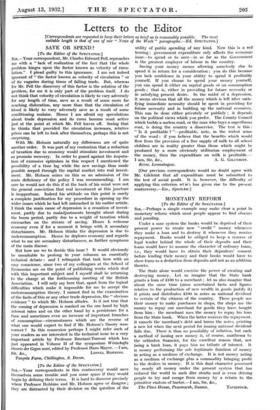Letters to the Editor
[Correspondents are requested to keep their letters as brief as is reasonably possible. The most suitable length is that of one of our " News of the Week " paragraphs.—Ed. SPECTATOR.]
SAVE OR SPEND ?
[To the Editor of the SPECTATOR.] SIR,—Your correspondent, Mr. Charles Edward Pell, reproaches me with a " lack of realization of the fact that the whole problem hinges upon the factor known as velocity of circu-
lation." I plead guilty to this ignorance. I am not indeed ignorant of " the factor known as velocity of circulation " or of its vagaries during times of falling trade. But, whereas for Mr. Pell the discovery of this factor is the solution of the problem, for me it is only part of the problem itself. I do not think that velocity of circulation is likely to vary adversely for any length of time, save as a result of some more far reaching dislocation, any more than that the circulation of • blood is likely to vary adversely save as a result of some conditioning malaise. Hence I am afraid my speculations about trade depression and its cures become most active just at the point at which Mr. Pell leaves off. Seeing that he thinks that provided the circulation increases, relative prices can be left to look after themselves, perhaps this is not surprising.
With Mr. Hobson naturally my differences are of quite another order. It was part of my contention that a reduction of taxation due to economy would stimulate investment and so promote recovery. In order to guard against the imputa- tion of excessive optimism in this respect I mentioned the possibility of a time lag while the new savings thus made possible seeped through the capital market into real invest- ment. Mr. Hobson seizes on this as an admission of the main deficiency of the policy I was recommending. I am sure he would not do this if at the back of his mind were not the general conviction that real investment at this juncture is inopportune. Indeed his attitude on this point is surely a complete justification for my procedure in opening up the wider issues which he had left untouched in his earlier article. I think the main cause of depression is a cessation of invest- ment, partly due to maladjustments brought about during the boom period, partly due to a weight of taxation which encroaches on the stream of saving. Hence L welcome economy even if for a moment it brings with it secondary disturbances. Mr. Hobson thinks the depression is due to underconsumption. Hence he deplores economy and regards what to me are secondary disturbances, as further symptoms of the main disease.
But how are we to decide this issue ? It would obviously be unsuitable to prolong in your columns an essentially technical debate : and I relinquish that task here with an easy conscience, since two of my colleagues at the School of Economics are on the point of publishing works which deal with this important subject and I myself shall be returning to the charge at the forthcoming meeting of the British Association. I will only say here that, apart from the logical difficulties which make it impossible for me to accept the underconsumption theory, I cannot find in the examination of the facts of this or any other trade depression, the " obvious evidence " to which Mr. Hobson alludes. Is it not true that the coming of depression is marked on the one hand by high interest rates and on the other hand by a persistence for a time and sometimes even an increase of important branches of consumption—circumstances which are the reverse of what one would expect to find if Mr. Hobson's theory were correct ? In " this connexion perhaps I might refer such of your readers as are interested in the technical issue to a very important article by Professor Breciani-Turroni which has just appeared in Volume II of the symposium Wirtschafts theorie der Gegen wart, edited by Professor Hans Mayer. —I am,
Sir, &c., LIONEL ROBBINS. Tanpits Farm, Chillingten, S. Devon.






























 Previous page
Previous page